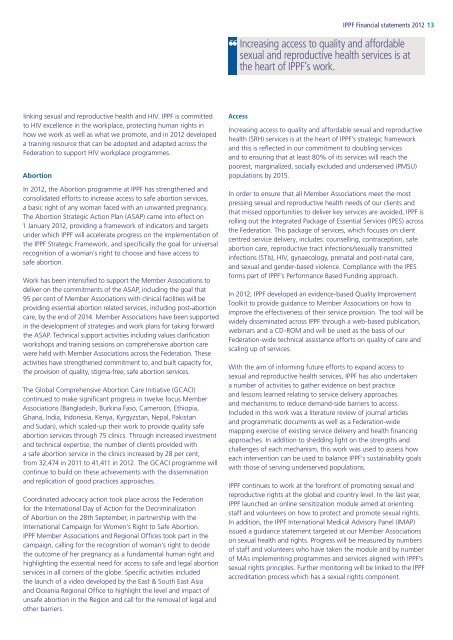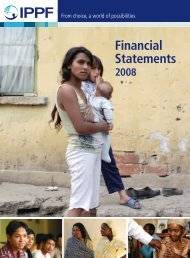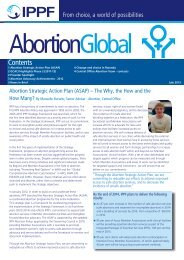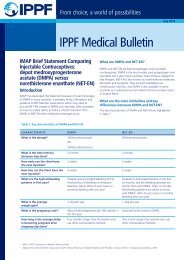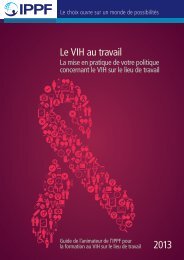Financial statements - International Planned Parenthood Federation
Financial statements - International Planned Parenthood Federation
Financial statements - International Planned Parenthood Federation
Create successful ePaper yourself
Turn your PDF publications into a flip-book with our unique Google optimized e-Paper software.
IPPF <strong>Financial</strong> <strong>statements</strong> 2012 13<br />
Increasing access to quality and affordable<br />
sexual and reproductive health services is at<br />
the heart of IPPF’s work.<br />
linking sexual and reproductive health and HIV. IPPF is committed<br />
to HIV excellence in the workplace, protecting human rights in<br />
how we work as well as what we promote, and in 2012 developed<br />
a training resource that can be adopted and adapted across the<br />
<strong>Federation</strong> to support HIV workplace programmes.<br />
Abortion<br />
In 2012, the Abortion programme at IPPF has strengthened and<br />
consolidated efforts to increase access to safe abortion services,<br />
a basic right of any woman faced with an unwanted pregnancy.<br />
The Abortion Strategic Action Plan (ASAP) came into effect on<br />
1 January 2012, providing a framework of indicators and targets<br />
under which IPPF will accelerate progress on the implementation of<br />
the IPPF Strategic Framework, and specifically the goal for universal<br />
recognition of a woman’s right to choose and have access to<br />
safe abortion.<br />
Work has been intensified to support the Member Associations to<br />
deliver on the commitments of the ASAP, including the goal that<br />
95 per cent of Member Associations with clinical facilities will be<br />
providing essential abortion related services, including post-abortion<br />
care, by the end of 2014. Member Associations have been supported<br />
in the development of strategies and work plans for taking forward<br />
the ASAP. Technical support activities including values clarification<br />
workshops and training sessions on comprehensive abortion care<br />
were held with Member Associations across the <strong>Federation</strong>. These<br />
activities have strengthened commitment to, and built capacity for,<br />
the provision of quality, stigma-free, safe abortion services.<br />
The Global Comprehensive Abortion Care Initiative (GCACI)<br />
continued to make significant progress in twelve focus Member<br />
Associations (Bangladesh, Burkina Faso, Cameroon, Ethiopia,<br />
Ghana, India, Indonesia, Kenya, Kyrgyzstan, Nepal, Pakistan<br />
and Sudan), which scaled-up their work to provide quality safe<br />
abortion services through 75 clinics. Through increased investment<br />
and technical expertise, the number of clients provided with<br />
a safe abortion service in the clinics increased by 28 per cent,<br />
from 32,474 in 2011 to 41,411 in 2012. The GCACI programme will<br />
continue to build on these achievements with the dissemination<br />
and replication of good practices approaches.<br />
Coordinated advocacy action took place across the <strong>Federation</strong><br />
for the <strong>International</strong> Day of Action for the Decriminalization<br />
of Abortion on the 28th September, in partnership with the<br />
<strong>International</strong> Campaign for Women’s Right to Safe Abortion.<br />
IPPF Member Associations and Regional Offices took part in the<br />
campaign, calling for the recognition of woman’s right to decide<br />
the outcome of her pregnancy as a fundamental human right and<br />
highlighting the essential need for access to safe and legal abortion<br />
services in all corners of the globe. Specific activities included<br />
the launch of a video developed by the East & South East Asia<br />
and Oceania Regional Office to highlight the level and impact of<br />
unsafe abortion in the Region and call for the removal of legal and<br />
other barriers.<br />
Access<br />
Increasing access to quality and affordable sexual and reproductive<br />
health (SRH) services is at the heart of IPPF’s strategic framework<br />
and this is reflected in our commitment to doubling services<br />
and to ensuring that at least 80% of its services will reach the<br />
poorest, marginalized, socially excluded and underserved (PMSU)<br />
populations by 2015.<br />
In order to ensure that all Member Associations meet the most<br />
pressing sexual and reproductive health needs of our clients and<br />
that missed opportunities to deliver key services are avoided, IPPF is<br />
rolling out the Integrated Package of Essential Services (IPES) across<br />
the <strong>Federation</strong>. This package of services, which focuses on client<br />
centred service delivery, includes: counselling, contraception, safe<br />
abortion care, reproductive tract infections/sexually transmitted<br />
infections (STIs), HIV, gynaecology, prenatal and post-natal care,<br />
and sexual and gender-based violence. Compliance with the IPES<br />
forms part of IPPF’s Performance Based Funding approach.<br />
In 2012, IPPF developed an evidence-based Quality Improvement<br />
Toolkit to provide guidance to Member Associations on how to<br />
improve the effectiveness of their service provision. The tool will be<br />
widely disseminated across IPPF through a web-based publication,<br />
webinars and a CD-ROM and will be used as the basis of our<br />
<strong>Federation</strong>-wide technical assistance efforts on quality of care and<br />
scaling up of services.<br />
With the aim of informing future efforts to expand access to<br />
sexual and reproductive health services, IPPF has also undertaken<br />
a number of activities to gather evidence on best practice<br />
and lessons learned relating to service delivery approaches<br />
and mechanisms to reduce demand-side barriers to access.<br />
Included in this work was a literature review of journal articles<br />
and programmatic documents as well as a <strong>Federation</strong>-wide<br />
mapping exercise of existing service delivery and health financing<br />
approaches. In addition to shedding light on the strengths and<br />
challenges of each mechanism, this work was used to assess how<br />
each intervention can be used to balance IPPF’s sustainability goals<br />
with those of serving underserved populations.<br />
IPPF continues to work at the forefront of promoting sexual and<br />
reproductive rights at the global and country level. In the last year,<br />
IPPF launched an online sensitization module aimed at orienting<br />
staff and volunteers on how to protect and promote sexual rights.<br />
In addition, the IPPF <strong>International</strong> Medical Advisory Panel (IMAP)<br />
issued a guidance statement targeted at our Member Associations<br />
on sexual health and rights. Progress will be measured by numbers<br />
of staff and volunteers who have taken the module and by number<br />
of MAs implementing programmes and services aligned with IPPF’s<br />
sexual rights principles. Further monitoring will be linked to the IPPF<br />
accreditation process which has a sexual rights component.


